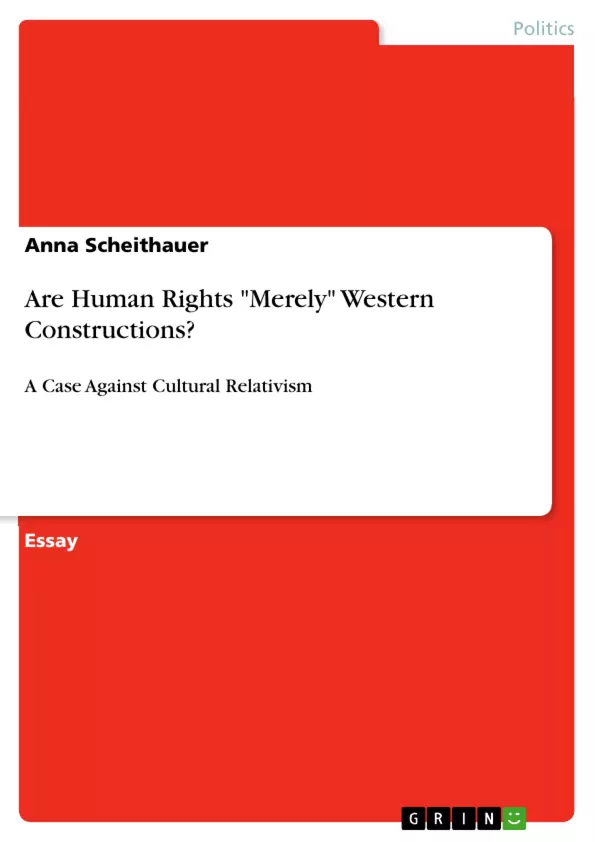In this essay, I have focused on the very content of human rights, thereby, relating to the debate between universalist and cultural relativist theory. While the former promotes the idea of equal rights for all human beings and considers culture irrelevant for the validity of moral rights, the latter views culture as the exclusive source of moral rights (Donelly, 1984, 400) and stresses, that “right” and “wrong” differ from culture to culture. (Tilley, 2000, 501) In the light of this debate, I have argued, that human rights are not merely “Western” constructions, as they withstand, despite their historical and geographical significance, accusations of cultural superiority (Tilley, 2000, 527) and of evaluations of other cultures according to the terms and conditions of “Western” culture (Oxford Dictionaries, 2013), or in short: of “Western” ethnocentrism. I have held this premise as response specifically to the allegation of cultural insensitivity brought forward by cultural relativism, which emphasizes human rights' ignorance towards cultural complexities by prioritizing some values over others, thereby, disregarding the collective spirit of some communities. This is said to render the concept of human rights inapplicable in non-”Western” societies. I have counter-argued that the human rights conception is culturally sensitive, as it recognizes diversity of moral views by promoting freedom of choice and the inclusion of voices otherwise left unheard under the umbrella of collectivism. Thereby, I have shown that universal values can indeed be justified, while cultural relativism fails to provide a sufficient explanation for moral validity. In this respect, I shall challenge the term “culture” and will show that human rights advocate tolerance. They do so through their stress on the preservation of cultural pluralism. Thus, they are not set out to destroy local culture but rather arguments of authority. (Tesón, 1985, 388) From this I have concluded, that the premise set out above holds true. Consequently, human rights by upholding universal moral values and by promoting cultural diversity, despite their geographical and historical distinctiveness, are more than “Western” constructions.
Table of Contents
- Are Human Rights „merely\" Western Constructions?
- Cultural Insensitivity: To Whom?
Objectives and Key Themes
This essay aims to counter the argument that human rights are merely "Western" constructions, arguing that they are universal and not limited to Western values. It explores the debate between universalist and cultural relativist theory, examining the claim that human rights are culturally insensitive and incompatible with non-Western societies.
- The universal validity of human rights.
- The relationship between human rights and cultural diversity.
- The critique of cultural relativism and its implications.
- The role of cultural sensitivity in the implementation of human rights.
- The challenges of reconciling universal values with cultural practices.
Chapter Summaries
- The essay begins by defining "Western" and "universal" in relation to human rights, arguing that the origins of human rights do not invalidate their underlying values. It then introduces the debate between universalist and cultural relativist theories, highlighting their different perspectives on the universality and cultural relevance of human rights.
- The second chapter focuses on the claim that human rights are culturally insensitive. It examines the argument that human rights prioritize individual rights over collective ones, neglecting cultural complexities and potentially undermining local cultures. The essay argues that cultural relativism itself can be seen as culturally insensitive by upholding practices that exclude certain groups from participating fully in society.
- The essay explores the challenges of reconciling human rights with cultural practices in the private sphere, particularly concerning family and religious rights. It discusses the critique of human rights provisions on marriage, family planning, and freedom of religion, arguing that these provisions are not inherently incompatible with cultural diversity and that flexibility in interpretation is possible.
- The final chapter examines the issue of cultural evolution and the potential for moral progress. It argues that cultural relativism fails to account for the dynamic nature of cultures and the possibility of challenging entrenched practices. The essay concludes by suggesting that the challenge lies not in justifying universal values but in implementing them in culturally sensitive ways.
Keywords
This essay explores the intersection of human rights, cultural relativism, universalism, cultural sensitivity, and moral progress. Key themes include the universality of human rights, the role of culture in shaping moral values, and the challenges of reconciling individual rights with collective traditions. The essay also discusses specific examples such as female genital mutilation (FGM), arranged marriage, and freedom of religion, highlighting the complexities of applying universal human rights principles in diverse cultural contexts.
Frequently Asked Questions
Are human rights just a "Western" invention?
The essay argues that while human rights have geographical origins, their values are universal and withstand accusations of being merely Western ethnocentric constructions.
What is the difference between universalism and cultural relativism?
Universalism promotes equal rights for all regardless of culture, while cultural relativism views culture as the exclusive source of moral rights, meaning "right" and "wrong" differ by society.
How does the essay address the claim of "cultural insensitivity"?
It argues that human rights are actually culturally sensitive because they promote freedom of choice and include voices that might be suppressed under strict collectivism.
Can universal human rights coexist with cultural diversity?
Yes, the essay suggests that human rights advocate for cultural pluralism and tolerance, aiming to challenge oppressive authority rather than destroy local culture.
What examples of cultural conflict are discussed?
The text touches upon complex issues like female genital mutilation (FGM), arranged marriage, and religious freedom within the human rights framework.
- Quote paper
- Anna Scheithauer (Author), 2014, Are Human Rights "Merely" Western Constructions?, Munich, GRIN Verlag, https://www.grin.com/document/350576



